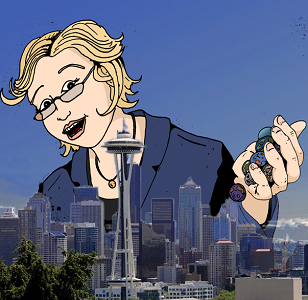
Our big focus this summer was hosting the 960-attendee Astrobiology Science Conference (AbSciCon) in nearby Bellevue, and running a day-long primer at UW beforehand for conference-going grad students to learn some of the fundamentals of astrobiology before diving head first into AbSciCon. Being invited to host this conference was a recognition of the prominence of our program on the national stage, and our students, postdocs and faculty took full advantage of the opportunity to also present many aspects of our scientific research. You can read about the science we presented in the article on AbSciCon.
I’d also like to highlight the excellent work done by UW AB grad Zach Cohen (Chemistry) and his advisor, Prof. Sarah Keller (Chemistry) on discovering what may be a key mechanism in the origin of life on our planet—chemistry that may have the stabilized and co-located components of the first cells. You can read all about this exciting development in our science highlight!
Our program continues to grow, expanding in alumni, student cohort and participating departments. We sent five of our students off to bright futures: Josh Krissansen-Totton (ESS & Astrobiology), Brett Morris (Astronomy & Astrobiology), Steven Sholes (ESS & Astrobiology), Michael Kipp (ESS & Astrobiology) and Osazonamen Igbinosun (Aeronautics & Astronautics & Astrobiology) graduated and have headed off to postdoctoral fellowships at Caltech, UC-Santa Cruz, the NASA Jet Propulsion Laboratory and the University of Bern. We are also delighted to welcome nine new students to the program: Kunmanee Buphamanee, Ping-Chun Lin, and Peter Wynn in Earth and Space Sciences; Hector Delgado-Diaz, Rudy Garcia and Samantha Gilbert in Astronomy; Greta Shum and Yuk Chun Chan in Atmospheric Sciences, and Joshua Sacks in Oceanography. Other progress in growing the program this year included starting the process to add Chemistry, Psychology and Genomics to the Astrobiology Program as participating departments that offer a Dual-Title PhD in the home department and Astrobiology. These departments will join the existing 8 Astrobiology participating departments (Astronomy, Earth and Space Sciences, Oceanography, Atmospheric Sciences, Biology, Microbiology, Environmental and Forest Sciences, Aeronautics and Astronautics).
I’d also like to highlight some recent alumni achievements, and in doing so, highlight the importance of the UWAB training program to the national scientific endeavor. This year, three of our alumni: Dr. Giada Arney (PhD, Astronomy & Astrobiology, 2016), Dr. Shawn Domagal-Goldman (UWAB Postdoctoral Scholar 2008-2010) and Dr. David Smith (PhD, Biology & Astrobiology, 2012) won Presidential Early Career Awards for Scientists and Engineers (PECASE). These PECASE awards are the highest honor bestowed by the US government on outstanding early career scientists. We are absolutely thrilled that three of our alumni were honored in this way, and so proud of the significant contributions to the STEM research, management and leadership, that earned them these awards.
Finally, I’ll end this letter by asking readers to please consider making a donation to support the Astrobiology Program. Despite all our research funding successes, government research funding cannot be used for most of the Program’s educational activities, including field workshops and training experiences in other labs. Donor funds can also help support career-enriching opportunities for our students such as conference attendance and scientific field trips. Any contribution, no matter how small, will be extremely welcome, and will help us to maintain our vigorous and excellent program supporting humanity’s search for life beyond our Earth!
Prof. Victoria Meadows
Director, UW Astrobiology Program
